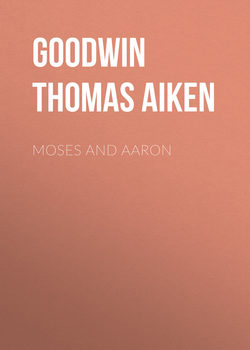Moses and Aaron

Реклама. ООО «ЛитРес», ИНН: 7719571260.
Оглавление
Goodwin Thomas Aiken. Moses and Aaron
THE FIRST BOOK. TREATETH OF PERSONS
CHAP. I. Of the form of the Hebrewes Common-wealth until Christ his coming, and when the Scepter departed from them
CHAP. II. Of the Publicans
CHAP. III. Israelites, Prosylites
CHAP. IV. Of their Kings
CHAP. V. The High-priest, Priests, Levites, and Nethinims
CHAP. VI. Of the Prophets
CHAP. VII. Of their Title Rabbi
CHAP. VIII. Of their Nazarites and Rechabites
CHAP. IX. Of the Assideans
CHAP. X. Of the Pharisees
CHAP. XI. Of the Sadduces
CHAP. XII. Of the Essenes
CHAP. XIII. Of the Gaulonitæ, and the Herodians
THE SECOND BOOK. TREATETH OF PLACES
CHAP. I. Their Temple
CHAP. II. Their Synagogues, Schools, and Houses of Prayer
CHAP. III. Of the Gates of Jerusalem
CHAP. IV. Of their Groves, and high Places
CHAP. V. The Cities of Refuge
THE THIRD BOOK. TREATETH OF DAIES and TIMES
CHAP. I. Days, Hours, Weeks, and Years
CHAP. II. Of their Feasts
CHAP. III. Of their Sabbath
CHAP. IV. Of their Passover, and their Feasts of Unleavened Bread
CHAP. V. Of their Pentecost
CHAP. VI. The Feast of Tabernacles
CHAP. VII. Of the Feast of Trumpets, and their New Moons
CHAP. VIII. The Feast of Expiation
CHAP. IX. The Sabbatical year, or Seventh years rest
CHAP. X. Of their Jubilee
CHAP. XI. The Feast of Purim, and the Feast of Consecration or Dedication
THE FOURTH BOOK. OF THEIR IDOLATRY
CHAP. I. The beginnings of Idolatry
CHAP. II. Of Moloch, Adram-Melech, Anam-Melech, Baal, The Tabernacle of Molech, Chiun, Rempham, Horses consecrated to the Sun, Thamuz
CHAP. III. Of Baal-Peor, Baal-Tsephon, Baal-Zebub, Baal-Berith, Bell and the Dragon
CHAP. IV. Of Dagon
CHAP. V. Of the molten Calf
CHAP. VI. Of Astaroth, Ammonia, Juno, the Queen of Heaven, Diana of the Ephesians
CHAP. VII. Of other Gods mentioned in Scripture
CHAP. VIII. The several manners of Divine Revelation
CHAP. IX. Their Teraphim
CHAP. X. The several sorts of Divination forbidden
THE FIFTH BOOK. OF THEIR CONSISTORIES
CHAP. I. Their Courts of Judgment, especially their Ecclesiastical Consistory
CHAP. II. Of their Excommunication
CHAP. III. Their Civil Consistories, what persons were necessarily present in them
CHAP. IV. The number of their Civil Courts
CHAP. V. Properties required in Judges, and the manner of their election
CHAP. VI. Ceremonies common in all capital Judgments
CHAP. VII. Their capital punishments
CHAP. VIII. Punishments not capital
CHAP. IX. Punishments borrowed from other Nations
THE SIXTH BOOK. OF MISCELLANEOUS RITES
CHAP. I. Of Circumcision
CHAP. II. Of their first fruits and their firstlings, or first-born
CHAP. III. Of Tithes
CHAP. IV. Of their Marriages
CHAP. V. Of their Burials
CHAP. VI. Of their Oaths
CHAP. VII. Of their Writing, Masorites, and their Work
CHAP. VIII. Of Israels pitching their Tents, or of their Camps
CHAP. IX. Their Measures
CHAP. X. Their Coyns. First of brazen Coyns
The Names of Authors cited in this BOOK
Отрывок из книги
The form and state of Government hath been subject to change and variation amongst all Nations, but especially amongst the Jewes, where these changes are observable.
At first, the Fathers of their several Families, and their First-born after them, exercised all kind of Government, both Eclesiastical and Civil, being both Kings and Priests, in their own houses. They had power over their own Families, to bless, curse, cast out of doors, disinherit, and to punish with death, as is apparent by these examples: of Noah towards Cham, Gen. 9. 25. of Abraham towards Hagar and Ismael, Gen. 21. 10. of Jacob towards Simeon and Levi, Gen. 49. 3. and of Judah towards Thamar, Gen. 38. 24.
.....
Thirdly,98 From the customs and manners of the world. This heresie of the Pharisees seemeth to have had its first beginning in Antigonus Sochæus. He being a Pharisee, succeeded Simon the Just; who was Coetanean with Alexander the Great: he lived three hundred years before the birth of Christ.
The Pharisees were99 not tied to any particular Tribe or Family, but indifferently they might be of any; S. Paul was a Benjaminite; Hyrcanus was a Levite.100 Each Sect had its Dogmata, his proper Aphorisms, Constitutions, or Canons: so the Pharisees had theirs. My purpose is, both concerning these and the other Sects, to note onely those Canons, or Aphorisms, wherein chiefly they were heretical, and one differing from the other.
.....